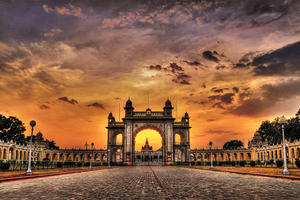New Delhi, Feb 15: For the second time in a row, Mysuru was today ranked cleanest city, followed by Chandigarh whereas Dhanbad and Prime Minister Narendra Modi's constituency, Varanasi, are among the 10 least clean cities in India, as per the first survey after the launch of 'Swachh Bharat' mission in 2014.
The survey, which was released by Urban Development Minister Venkaiah Naidu here, covered 73 cities including 51 cities with more than 10 lakh population on cleanliness and sanitation.
"Swachh Survekshan-2016 is primarily intended to measure the impact of the efforts under Swachh Bharat Mission launched after the survey of 2014," Naidu added.
While Mysuru has topped the list followed by Chandigarh, Tiruchirappalli and NDMC area of the national capital, Dhanbad in Jharkhand has been ranked the worst.The city of palaces was ranked first in the list of 476 cities last year.
Other cities which have found place in 10 cleanest category in the Survey, conducted by Quality Council of India, include Visakhapatnam (Andhra Pradesh), Surat (Gujarat), Rajkot (Gujarat), Gangtok (Sikkim), Pimpri-Chindwad (Maharashtra) and Greater Maharashtra.
The least clean cities included Dhanbad (Jharkhand), Asansol (West Bengal), Itanagar (Arunachal Pradesh), Patna (Bihar), Meerut (Uttar Pradesh), Raipur (Chhattisgarh), Ghaziabad (Uttar Pradesh), Jamshedpur (Jharkhand), Varanasi (Uttar Pradesh) and Kalyan Dombivili (Maharashtra).
Cities from South and West continue to do well overall but those in other parts of the country, particularly, in the North are beginning to catch up with the traditional leaders, Naidu said.
"The results of the survey were analysed to identify the top leaders, aspiring leaders, cities where accelerated efforts need to be made and the slow movers," he added.
Last cleanliness survey was conducted in 2014 among 476 cities with a population of one lakh and above and its results were announced last year. That survey was done before the launch of 'Swachh Bharat' mission'.
"This (ranking) is meant to help the cities know where they stand in absolute terms and in relation to others besides what more needs to be done by each city to ensure sanitation. In that sense, the survey is more holistic, participatory, purposeful and meaningful for future guidance and evolving course of action," the minister added.
Here is the list of 10 clean cities:
1. Mysuru (Karnataka)
2. Chandigarh
3. Tiruchiraplli (Tamil Nadu)
4. New Delhi
5. Visakhapatnam (Andhra Pradesh)
6. Surat (Gujarat)
7. Rajkot (Gujarat)
8. Gangtok (Sikkim)
9. Pimpri Chinchwad (Maharashtra)
10. Greater Mumbai (Maharashtra)
Cities at the bottom of the list:
64. Kalyan Dombivili (Maharashtra)
65. Varanasi (Uttar Pradesh)
66. Jamshedpur (Jharkhand)
67. Ghaziabad (Uttar Pradesh)
68. Raipur (Chhattisgarh)
69. Meerut (Uttar Pradesh)
70. Patna (Bihar)
71. Itanagar (Arunachal Pradesh)
72. Asansol (West Bengal)
73. Dhanbad (Jharkhand)
Cities that have the potential to lead the pack:
Panaji (Goa, ranked 16)
Thane (Maharashtra, ranked 17)
Coimbatore (Tamil Nadu,ranked 18)
Hyderabad (Andhra Pradesh, ranked 19)
Nagpur (Maharashtra, ranked 20)
Bhopal (Madhya Pradesh, ranked 21)
Allahabad (Uttar Pradesh, ranked 22)
Vijayawada (Andhra Pradesh, ranked 23)
Bhubaneswar (Odisha, ranked 24)
Indore (Madhya Pradesh, ranked 25)
Madurai (Tamil Nadu,ranked 26)
Shimla (Himachal Pradesh, ranked 27)
Lucknow (Uttar Pradesh, ranked 28)
Jaipur (Rajasthan, ranked 29)
Gwalior (Madhya Pradesh, ranked 30)
Nashik (Maharashtra, ranked 31)
Warangal (Telengana, ranked 32)
Agartala (Tripura, ranked 33)
Ludhiana (Punjab, ranked 34)
Vasai-Virar (Maharashtra, ranked 35)
Cities that need acceleration:
Chennai (Tamil Nadu, ranked 36)
Gurgaon (Haryana, ranked 37)
Bengaluru (Karnataka, ranked 38)
South Muncipal Corporation of Delhi (New Delhi, ranked 39)
Thiruvananthapuram (Kerala, ranked 40)
Aizawl (Mizoram, ranked 41)
Gandhinagar (Gujarat, ranked 42)
North MCD (New Delhi, ranked 43)
Kozhikode (Kerala, ranked 44)
Kanpur (Uttar Pradesh, ranked 45)
Durg (Chhattisgarh, ranked 46)
Agra (Uttar Pradesh, ranked 47)
Srinagar (Jammu and Kashmir, ranked 48)
Amritsar (Punjab, ranked 49)
Guwahati (Assam, ranked 50)
Faridabad (Haryana, ranked 51)
East MCD (New Delhi, ranked 52)
Shillong (Meghalaya, ranked 53)




Comments
Mangalore not on Top 53, of the 73 recognized cities is hard to believe. regardless, need to take this survey in right spirit and every mangalorean need to contribute in their bit in not making the city any dirty. We helplessly trust that our Municipal and district administration shall feel the guilt of not making the city in good ranks and take measures to improve...We mangalorean City-Zens are proud of our city for its history & potential and should fight every evil trying to destroy its growth and prosperity.
Add new comment